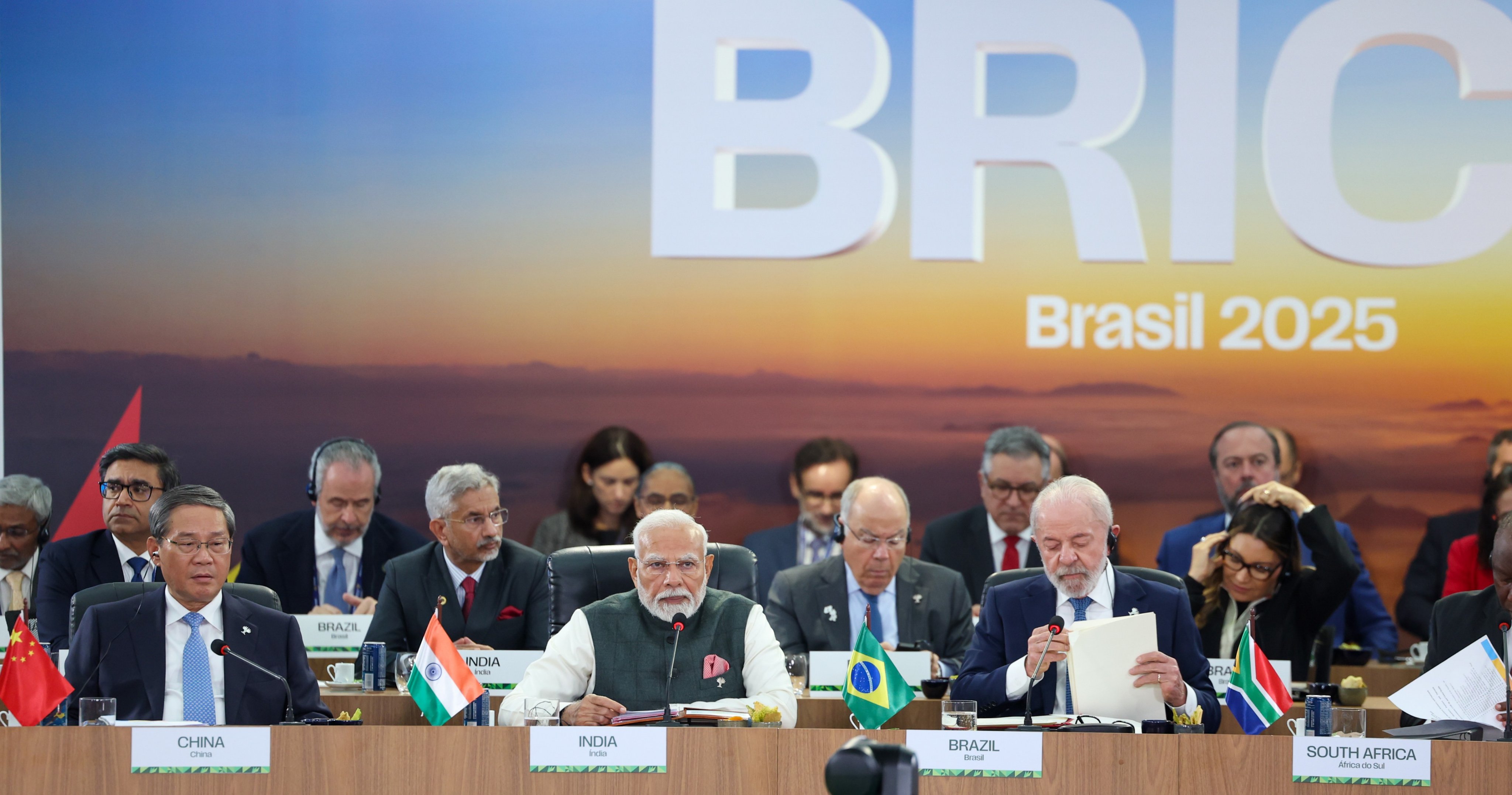BRICS vs Trump: Trump Pushes Tariff War and Judicial Sanctions, BRICS Nations Push Back Against US Pressure
A wave of hardening rhetoric and punitive economic measures from Washington has triggered growing resistance across BRICS nations, as Brazil, India, and Russia face what officials describe as “targeted pressure” from the United States under President Donald Trump.
On Tuesday, Brazilian President Luiz Inacio Lula da Silva stated flatly that he would not be calling Trump to discuss escalating trade tensions. “I will not call Trump because he does not want to talk,” Lula told reporters, amid a fresh 50% tariff hike on Brazilian imports by the US.
 |
| Image Source: PM NaMo on X |
The U.S. Treasury accuses de Moraes of leading “politicised prosecutions” against former President Jair Bolsonaro, who faces coup-related charges. Brazil rejected the move as “foreign interference” and reaffirmed the independence of its judiciary.
In parallel, Trump has reignited a trade confrontation with India. In an interview with CNBC, he accused New Delhi of “fueling the Russian war machine” by continuing to import Russian crude oil, claiming India was reselling it on the open market “for big profits.”
Trump announced a 25% tariff hike — effective August 7 — with threats to “substantially raise” it within 24 hours.
India has not officially responded to this new escalation. However, just a day earlier, the Ministry of External Affairs had issued a data-driven rebuttal to U.S. and EU criticism of its Russian oil trade.
The government emphasized that India's procurement is based on affordability and stability, particularly after traditional suppliers diverted to Europe post-Ukraine war.
The MEA underscored that many of the nations targeting India continue to import Russian goods, including oil, LNG, and uranium, on a scale far greater than India.
The United States has also become increasingly critical of India’s long-standing defense relationship with Moscow. Trump remarked that India “has always bought a vast majority of their military equipment from Russia” and labeled New Delhi a “not good trading partner.”
Amid these developments, Indian National Security Advisor Ajit Doval landed in Moscow on a scheduled visit to discuss strategic cooperation. As reported by Russian news agency TASS, the agenda includes defense ties and energy supplies.
While not directly linked to Trump’s remarks, the timing of the visit signals deepening alignment between India and Russia in response to shifting global alignments.
Meanwhile, in Moscow, the Kremlin announced its formal withdrawal from the 1987 Intermediate-Range Nuclear Forces (INF) Treaty, citing "direct threats" from increased U.S. military deployments in Asia.
Russia specifically referred to the deployment of U.S. Typhon missile systems in the Philippines and joint missile drills in Australia as key provocations.
The end of the INF Treaty, once a pillar of Cold War arms control, reflects the wider breakdown of global strategic stability.
President Vladimir Putin had previously warned that U.S. actions were dismantling the post–Cold War security architecture.
Across the BRICS bloc, what was once a loose economic coalition is now emerging as a shared front of resistance against what members increasingly perceive as unilateral, personalistic U.S. pressure.
From Lula’s refusal to yield to Trump’s conditions, to India’s data-backed rejection of energy hypocrisy, and Russia’s INF exit, a pattern is taking shape.
Each BRICS nation is responding in its own way, but the cumulative effect is a hardening of positions.
The Trump administration’s confrontational tone has drawn criticism not just from foreign governments but from policy experts within the U.S. Harvard political scientist Steven Levitsky described Trump’s foreign policy posture as “personalistic” and driven by loyalty tests, rather than strategic engagement.
Diplomatic attempts at resolution have faltered. A delegation of Brazilian senators that visited Washington to defuse tensions reportedly found White House access restricted and U.S. positions ideologically charged.
India’s external affairs minister, S. Jaishankar, recently emphasized the need for a “fair and representative global order”, not one dominated by a few, in remarks seen as a pointed rebuttal to Washington's aggressive stance.
What was once friction over trade and tariffs has morphed into a broader clash over sovereignty, alliances, and global governance.
With the BRICS summit having just happened and global energy markets in flux, the real test may be whether the bloc can translate this collective resistance into a coherent strategic posture.
For now, what may be waiting is that BRICS might become a geopolitical counterpoint to Western hegemony, and that may happen because Trump is pushing each of these countries too hard to focus on areas of convergence among them.
